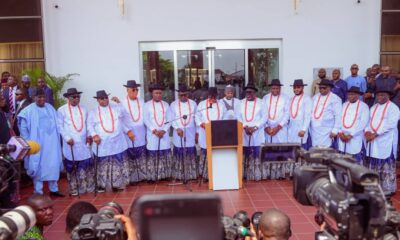Business
Nigeria Loses $3.27bn To Oil Theft In 14 Months
The Federal Government has disclosed that Nigeria lost about $3.27 billion worth of oil to massive crude oil theft and pipeline vandalism in the Niger Delta in the last 14 months.
According to the government, high-level cases of oil theft have become a threat to the country’s corporate and economic existence, with the industry now thinking of transporting crude oil from fields to export terminals by trucks.
This is in the face of the Independent Petroleum Producers Group (IPPG) alledging that about 82 per cent of its members’ oil production was stolen in the month of February 2022.
In a presentation at a stakeholders’ engagement on oil theft in Abuja on Friday, the Nigerian Upstream Petroleum Regulatory Commission (NUPRC) said the government was extremely worried about the tragic situation.
NUPRC disclosed that most of the crude oil losses came from Bonny Terminal Network, Forcados Terminal Network, and Brass Terminal Network.
It listed factors that were aiding the criminal activities to include economic challenges, inadequate security, poor surveillance, poor community engagements, exposed facilities and stakeholder compromises.
The commission stated that due to the high level of theft, the country has been unable to meet its OPEC production quota.
Speaking on the issue, the Chief Executive of NUPRC, Engr. Gbenga Komolafe, said the government was determined to end the menace so that the country can benefit from the rising price of oil and also to protect the environment from oil spills.
“The issue of oil theft has become a very worrisome issue to the government of Nigeria and I believe to you as investors too”, he said.
Komolafe stressed that it was important that the government and the oil companies work together to resolve the issue, especially on the agreed volume of oil lost to vandals, saying that the issues strike at the heart of Federation revenue.
“You will recall that in the last one week we have set up a crack team for us to determine the accurate figure because as a government we cannot continue to act on the basis of an abstract or inaccurate figure in dealing with an important issue as crude oil theft because the issue goes to the heart of federation revenue”, he explained.
“The concern of the government”, he continued, “is to increase our national oil production. Basically, we are an oil economy and when the upstream is sick, it affects the wellbeing and the health of the country.
“The situation that is happening in the upstream is getting to the level of threat to the existence and wellbeing of Nigeria.
“As a responsible regulator, we are very concerned about it. We have been doing a lot and we are not relenting. We will do everything possible to increase oil production in a manner that will make the nation benefit from the upward swing in the international price of crude oil”, Komolafe assured.
Business
Expert Tasks Government On Civil Maritime Security Unit
Business
Bayelsa Recommits To Infrastructure, Sectoral Dev … Rakes In N227.185b From IGR
Business
NDYC Seeks NDDC Commercialisation … Uncompleted Projects Completion
-
News5 hours ago
NIS Begins Contactless Passport Application In Europe, Friday
-
Politics39 mins ago
Grassroots Governance: Otu Signs Cross River Local Government Amendment Bill Into Law
-

 News1 hour ago
News1 hour agoFubara Attends PDPGF Meeting In Asaba …..Back Court Verdict On National Secretary Position
-
Business52 mins ago
REA, RESCOs Sign Agreement To Establish 23 Mini-grids
-
News4 hours ago
Telecom Operators Dismiss Talks With NLC On Tariff Hike
-
Politics38 mins ago
How Akande Lied Against Me Over Bola Ige’s Case – Ladoja
-
Rivers1 hour ago
Police Confirm Vehicle Insurance Policy Enforcement In Rivers
-
Business52 mins ago
Oil Production Resumption: Ogoni Youths Seek Inclusion In FG’s Plans

